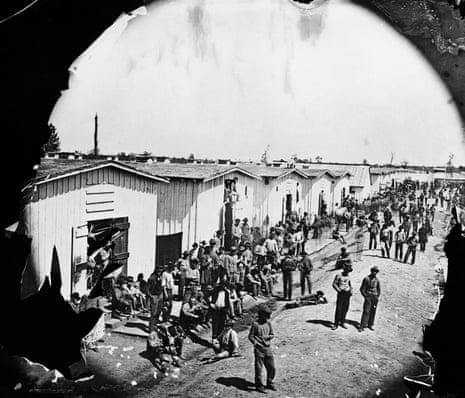Mention the American civil war in Britain today and you are likely to encounter something close to a unanimity of views. The north were the goodies. The south were the baddies. The northern states had history and right on their side, whether on slavery and race or on the question of maintaining the union. The south, by extension, was wrong and against history on both counts. So, in short, the right side won. Moreover, in Abraham Lincoln the federal side had one of the greatest leaders America has ever produced, the man who rose to the occasion in deeds and words to save his country, and whose murder was one of the greatest calamities in the republic's history.
Those are almost certainly, in broad terms, the views of the conflict held by most readers outside parts of the American south, just as they are, equally broadly, my own. They are indeed the official version. Happily, there is a good amount of truth in them. Yet not only was the civil war less straightforward than this benign retrospective view suggests, it was also a much more divisive conflict in Britain than the received pro-northern and anti-southern consensus lets us see. The imminent 150th anniversary of the start of the war is a good time to venture out of our comfort zone.
The best recent guide to a historically informed approach is Amanda Foreman's book A World on Fire. Foreman stumbled on her subject while researching her bestselling 1999 biography of Georgiana, Duchess of Devonshire. In the family archives she discovered that the heir to the Devonshire title – later the eighth duke – had spent Christmas Day 1862 making eggnog for Robert E Lee's Confederate cavalry officers in Virginia.
This Devonshire heir, though, was not some deranged rightwing romantic but one of the pillars of Victorian Liberalism. As Lord Hartington, he served in Gladstone's first two Liberal cabinets, introduced the secret ballot into British law, pulled troops out of Afghanistan in the 1880s, was leader of the Liberal party in opposition, nearly became PM, and finally broke with Gladstone over home rule for Ireland, becoming leader of the breakaway Liberal Unionists – an irony for a man who had sided with the Confederates 20 years previously.
Yet as Foreman shows, Hartington's support for the south was anything but unusual among liberal and progressive 1860s Britain. This country was almost as torn over the civil war as Americans themselves. Many went to fight. The war even crossed the Atlantic, with a battle between Union and Confederate ships in the Channel in 1864. The political parties, and Lord Palmerston's Whig government, were split down the middle over the issues. And the battle for British public opinion was hard-fought, too.
Which raises the question of where the Guardian stood. Surely the paper, every bit as much a pillar of Victorian Liberalism as Lord Hartington, was solid in the union cause? So you might think, if you only read history through the eyes of the present. Yet the Manchester Guardian was as conflicted as many others of progressive views – and some of those inner conflicts of view have resonance even today.
The issue that caused the problem for the Guardian was not slavery. The Guardian had always hated slavery. But it doubted the Union hated slavery to the same degree. It argued that the Union had always tacitly condoned slavery by shielding the southern slave states from the condemnation they deserved. It was critical of Lincoln's emancipation proclamation for stopping short of a full repudiation of slavery throughout the US. And it chastised the president for being so willing to negotiate with the south, with slavery one of the issues still on the table. All of which criticisms were true.
Nor was the paper, ostensibly at least, embarrassed by the issue of cotton. The Guardian was not the voice of those Lancashire cotton manufacturing interests who wanted the British government to break the north's blockade on the southern cotton-exporting ports. It was opposed to picking a quarrel with the union in order to keep the cotton flowing. "There was not a man of position in Manchester," the American ambassador's son Henry Adams wrote in his diary, "who would venture to say to Lord Palmerston 'interfere for the cotton', not a man." This paper, like many cotton workers, was against intervention.
The great stumbling-block issue for the Guardian and many other liberals was the right to self-determination. The paper believed that the south had the right to secede and to establish an independent state. It suspected that it would succeed. It thought, as Gladstone did, that this might hasten the end of slavery – and it may have been right, since no slave society, including Cuba and Brazil, survived into the 20th century. Above all, though, the paper wanted to be consistent. It had supported independence for the Slavs, the Hungarians, the Italians and the Egyptians – so why not for the Confederates, too?
More than anyone, Lincoln stood for the preservation of the union at all costs. As a result the Guardian was ferociously against him, to a degree that now seems not just perverse but even shaming. Lincoln was undoubtedly sincere, the paper said in October 1862, but "it is impossible not to feel that it was an evil day both for America and the world, when he was chosen president of the United States".
The Guardian's anti-Lincoln obsession reached its heights in the April 1865 editorial on, of all things, the president's assassination. "Of his rule we can never speak except as a series of acts abhorrent to every true notion of constitutional right and human liberty," the paper wrote, before tactfully adding that "it is doubtless to be regretted that he had not the opportunity of vindicating his good intentions".
It is hard to imagine a more baleful editorial than the Guardian's verdict on the slain president. Yet that 1865 leader writer was of his era. He was writing about immensely difficult issues – unity of states or their breakup, the price of victory in terms of lives lost, whether to intervene in support of a big principle, self-determination weighed against injustice, the place of ruthlessness in human affairs, the role of the individual – which are as irresolvable and hard to balance today as they were 150 years ago. He was not to know that later generations would have a different set of priorities. He was sailing into the darkness. He couldn't foretell the future. And neither, we sometimes need to remind ourselves amid our own certainties, can we.

